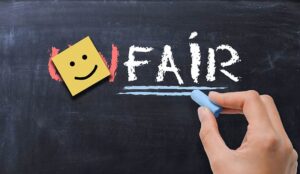Are you being fair to your agents and customers alike? It’s a tricky question to answer!
To unpick this issue, Dr M. Dave Salisbury asks “What is really fair?” in a contact centre, particularly in an environment where representatives possess an incredible amount of responsibility and get much of the blame, even though they have the least amount of influence to impact a customer service issue. Or so it seems…
Employees Should Never Be Measured for Productivity If They Do Not Control All the Variables

Recently, I heard a very successful business owner relate a story about two employees who held a mission-critical job.
These employees had valid and just reasons for why they kept failing at their jobs, and when the solution was proposed to them, they decried it as unfair.
Yet, when these same employees became actively engaged in being part of the mission of the business through a compensation bonus structure, they engaged fully, even though they decried the unfairness of other people’s mistakes being integral in their bonus structure.
Was It Fair to Require Employees to Clean Up Someone Else’s Mess?
Was it fair to have the mistakes of others heaped upon them? Would the answer surprise you if it was affirmative?
The businessman relating the story about these employees outlined the new behaviours demanded, added a bonus structure that was 100% controlled by the employees based upon mistakes that shipped to a customer, and the bonus went up or down based solely upon the inputs from the customers that they controlled.
If the mistakes of others got to an end customer, they would lose money in their bonus. If no mistakes made it to a customer, their potential bonus was increased by the same amount.
Nevertheless, the employees’ bonus hinged upon catching mistakes from sales, marketing, vendors, etc. and continued to be decried as “unfair”. Here is where the paradox of “fair” hits the road of productivity.
If these employees knew mistakes had been made in completing an order by sales, and they shipped the mistakes anyway, who was being unfairly treated? The customer? The shipping employees being discussed in the story? Or the salesperson who took the order?
Where does ultimate responsibility lie?
Many times, especially in business, responsibility for mistakes and “fair” are separated, and ultimate responsibility is left with the last chance to get an order right, or the last employee who had the most opportunity to make something right.
Taking ownership of customers’ issues can be a great tool. For advice on implementing this in your contact centre, read our article: Training Your Team to Take Ownership
Customer Service Representatives Possess an Incredible Amount of Responsibility and Get Much of the Blame
This is exactly what we see all the time in contact centres.
Customer service representatives possess an incredible amount of responsibility, and get much of the blame, even though they have the least amount of influence to impact a customer service issue.
Except, per a dictionary definition of “fair” – see below – this is 100% fallacious and incorrect.
“What Is Fair?”
The basic definition of fair, according to and summated from Webster, is that of a person treating others without partiality or prejudice, and in accordance to established law.
Other sources try to add the following:
- Impartial and honest – Free from prejudice, favouritism, or self-interest
- Conforming to rules – Allowed or in accordance with established rules
- Reasonable – Just or appropriate in the circumstances
The University of Pittsburgh “Keyword Project” has probably the most intriguing perception of fair: “Fairness means giving people what they deserve – and what people deserve depends on how they behave.”
If customer service is repeatedly seeing the same problem producing customer complaints, and they tell nobody in operations, has customer service met their obligation to fix problems? No, they have not.
Is it fair for customer service to be an information valve to operations? Behaviour includes communication, processes, procedures, and policies require adherence (behaviour) to be most effective, and the business’s bottom-line performance hinges upon the behaviours of those employees.
Nevertheless, these are departments (operations, sales, marketing, customer support, shipping, etc.) not individuals, so surely the department is to blame not individuals, right? Wrong!
Again, the principles of “fair” come into play, where a department, which is full of people, tries to shuck responsibility for their behaviours by hiding them in the department. These behaviours create more problems, more customer service issues, and lower returns on investment (ROI).
Getting internal communication right is a must have, so if you are looking to improve this, read our article: 7 Clever Ways to Improve Internal Communication Between Departments
At the Most Basic Level, “Fair” Is Equal Treatment Under the Law
When discussing the many levels of “fair” one must place the definition of “fair” in context logically to improve the perception of what is and is not “fair.” At the most basic level, “fair” is equal treatment under the law.
Consider the retail theft laws in California and New York. These laws are fundamentally unfair, because whole groups of the population are suffering.
Two people walk into Walmart and walk out without paying. In Texas, one of these people is going to get a pretty harsh sentence and one in California is not going to be charged at all.
On a national level, the laws of California are unfair to the victim, Walmart. Regardless of the state where the crimes were committed, Walmart remains a victim, and it is not being recompensed unless it pursues charges in the small claims court. Walmart is socially expected to eat the loss.
However, there remain other victims. For example, consumers will pay a higher price at Walmart as they pass along retail theft expenses. It is “fair” for a Japanese consumer to pay higher retail prices when their entire society is not engaged in wholesale retail theft?
Other victims include the share and stockholders, who, due to losses in retail theft, court fees, etc. realize a smaller ROI than expected. Communities are also victims, as subsequent retail store closures can result in food deserts, making it difficult for customers to buy the food they need nearby.
Are any of these victims going to see retribution?
No. They will continue to swallow losses because the legal system has been warped and twisted to allow retail theft, and this is fundamentally unfair. When all people cannot be treated equally under the law, the system is fundamentally unfair.
A legislative body voting to condone theft does not make legalized theft moral or fair. The situation remains dire, because laws, regulations, policies are fundamentally unfair when they do not apply equally to all.
Productivity Measurements and the Question of “Fair”
One of the many levels of fair derives from productivity standards: if two random people cannot perform a task in the allotted time, the productivity measure needs to be redrafted.
The principle of productivity measurements and needing these to measure items the employee controls (absolutely) and whether this is “fair” is now open for discussion.
In the businessman’s story, were the employees in charge of all the variables they were being measured by for performance and productivity?
Yes. Moreover, the new system helped them see their responsibilities in their current roles in a significantly different light.
Nevertheless, these employees still had to catch problems from sales, marketing, vendors, etc., for these had always been the expectations of their roles, but these employees, even though valid, only had excuses.
Excuses from employees should never be accepted as explanations for failure. When an employee is making an excuse, there is a training issue that their direct supervisor needs to address. Is it “fair” to claim that behaviours that are not culturally acceptable are a manager’s responsibility?
Absolutely! Why? Because there is a responsibility and an accounting on that manager’s shoulders for the behaviours of their employees.
Just as the director was accountable and responsible for the behaviours of the managers, and the VP was similarly accountable for the behaviours of the directors, and the owners and shareholders are accountable to the customers and other stakeholders for the behaviour of the company’s bottom-line performance.
If a Manager Does Not Want to Train, Are the Employees to Be Blamed for Improper Behaviour?
Nevertheless, the question remains, if behaviour is a training issue, and the manager does not want to train, are the employees to be blamed for improper behaviour?
To answer this question, another question must be asked: “How are managerially acceptable behaviours learned?”
By observation! Meaning that the employees of a manager who refuses to train remain accountable for behaviours that are unacceptable to the company culture. Is it “fair” to the employees of a manager (who does not train) to blame poor behaviour on the employee?
Yes. The employees with inappropriate behaviours have others they can look to for examples of managerially acceptable behaviours. After all, never forget the existence of the employee handbook!
Sometimes training can be pushed aside due to staffing shortages. If you want advice on making sure you keep it up, read our article: How to Keep on Top of Training in a Short-Staffed Contact Centre
“Fair” Remains a Crucial Topic in Achieving Business Goals and Improving Employee Morale
While fair or unfair is a legal issue, and HR will want a say, the reality is quite different; principles of fairness are an operations issue, and solving them will require operations leaders to understand that exemptions are unfair, and design a rule, regulation, policy, or process to be fair.
If you think a change is needed due to fairness, and the suggested change places people on unequal grounds under the law, you run a serious risk of being unfair, and face some stiff penalties for creating unfair conditions in the workplace.
It might seem odd to discuss principles of fairness or the levels of fair; however, “fair” remains a crucial topic in achieving business goals and improving employee morale.
Want to remove complaints and excuses for failures? Check your policies, procedures, and processes for how fair they are. You might be surprised!
Written by: Dr M. Dave Salisbury, COO at D&C Consulting LLC
For more information on fairness and morale in the contact centre, read these articles next:
- Proven Ways to Maintain Fairness in the Contact Centre
- Avoiding the Fairness Trap When Creating Schedules
- 15 Surprises for Boosting Agent Morale
Author: Dave Salisbury
Reviewed by: Jo Robinson
Published On: 20th May 2025 - Last modified: 15th Sep 2025
Read more about - Call Centre Management, Dave Salisbury, Employee Engagement, Key Performance Indicators (KPIs), Leadership, Management Strategies, Morale, Team Management, Top Story


















